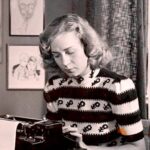Poems by Tove Ditlevsen
Translated from the Danish by Michael Favala Goldman and Cynthia Graae
The Tavern
Folks in the tavern
are not adults
not drunk and
not sober.
The professor tells about
the time he played
billiards with three murderers.
Two of them were respectable and
looked down on the childkiller,
who moreover
played billiards poorly.
The professor is nearly deaf.
Two models from the academy
with licorice eyes
stare at him fascinated
without really forgetting
the wheezing painter
who was operated on
for throat cancer.
The professor goes out to pee.
He has a magnificent head
says one of the table whores
who has taken the trouble
to put on her youth.
In the tavern
people speak only well
of each other.
Here you see people
you haven’t met
in twenty-five years.
Some don’t know
where they’ll spend the night.
They can’t figure life out.
They’re not unhappy.
They’re not happy.
They’re always buying rounds.
They live on credit.
They are not impressive
and they think
entirely in the wrong lines.
Outside in the square
people with goals walk
without worn-down heels
without fear of
harsh light and poverty.
They think the professor died
many years ago.
Being refined people
they know
the wheezing painter’s name.
Down at the tavern
no adults are
secure and independent.
They get along
with each other.
The table whores leave
at five o’clock.
They have to put the potatoes on.
They don’t have it easy.
They must make dinner
for a husband who sits
somewhere else enjoying himself
and has to leave
because his wife
is waiting with his meal.
Vinstuen
Folk i vinstuen
er ikke voksne
ikke fulde og
ikke ædru.
Professoren fortæller om
dengang han spillede
billard med tre mordere.
To af dem var anstændige
og så ned på barnemorderen,
der ovenikøbet
spillede dårlig billard.
Professoren er næsten døv.
To modeller fra akademiet
med lakridsøjne
stirrer betaget på ham
uden dog at glemme
den hvæsende maler
deer er opereret
for strubekræft.
Professoren går ud for at tisse.
Han har et pragtfuldt hovede
siger en af bordluderne
som har gjort sig den umage
at iføre sig sin ungdom.
I vinstuen
taler man kun godt
om hinanden.
Her ser man mennesker
man ikke har mødt
i fem og tyve år.
Nogle ved ikke,
hvor de skal tilbringe natten.
De kan ikke finde ud af livet.
De er ikke ulykkelige
de er ikke lykkelige.
De gir omgange hele tiden.
De lever på forskud.
De er ikke prægtige
og de tænker
i helt forkerte baner.
Ude på torvet
færdes de målbevidste
unden skæve hæle
uden angst for
skarpt lys og fattigdom.
De tror professoren er død
for mange år siden.
Som dannede mennesker
kender de godt
den hvæsende malers navn.
Nede i vinstuen
er ingen voksne
sikre og selvstændige.
Alle har det godt
med hinanden.
Bordluderne går
klokken fem.
De skal sætte kartofler over
og har det svært.
De skal lave middagsmad
til en mand der sidder
et andet sted og har det godt.
og må bryde op
fordi konen
venter med maden.
Divorce 2
The day he
picked up
his furniture
and his books
the frost was
gone from the ground
so the brick masons
in the region
could pour
foundations
for the Norwegian
tract houses.
It was a Thursday.
Spring is on the way
said the cleaning woman.
Only two of the
ten toy soldiers were left.
The child was unhappy
but controlled himself.
The bookshelves were dusty
no one had thought of that.
The walls were covered with sores
from the missing pictures.
We drank a beer
with the mover.
Outside a woman
carried a shopping bag
with leek tops
sticking out.
It was a completely
ordinary day.
We were in agreement
and considerate.
The spindly boy
walked between us
with adult eyes.
Pictures
on a strange wall.
A strange woman
hammers in nails.
A strange man
comes with new
habits in his suitcase.
The frost lost its hold.
The mittens fell down
from the radiator.
A man’s back
conveys more
than he said
in eighteen years.
Another man and
another woman
repelled
by memory.
The day was
meaningless
like that we call
love.
I’ll visit the two of you
now and then
he said.
There is no reason to —
it is not
easy for me either
he said.
The mover
wiped foam
from his upper lip.
It was a Thursday
in parentheses.
The brackets around it
are already faded.
Life tastes like ashes
and can be endured.
Skilsmisse 2
Den dag han
hentede
sine møbler
og sine bøger
var frosten
gået af jorden
så murerne
i oplandet
kunne støbe
fundamenter
til de norske
typehuse.
Det var en torsdag.
Foråret er på vej
sagde rengøringskonen,
Der var kun to tillbage
af ti små negerdrenge.
Barnet var ked af det
men beherskede sig.
Reolerne var støvede
det havde ingen tænkt på.
Væggene fyldtes mad sår
efter fjernede billeder.
Vi drak en øl
med flyttemanden.
Udenfor gik
en kone med et net
hvoraf porreduske
stak op.
Det var en helt
almindelig dag.
Vi var enige
og hensynsfulde.
Den smalle dreng
gik imellem os
med voksne øjne.
Billeder
på en fremmed væg.
En fremmed dame
slår søm i.
En fremmed herre
kommer med nye
vaner i sine kuffert.
Frosten løsnede sig.
Vanterne faldt ned
fra varmeapparatet.
En mands ryg
udtrykker mere
end han har sagt
i atten år.
En anden herre og
en anden dame
preller af mod
erindringen.
Dagen var
meningsløs
som det man kalder
kærlighed.
Jeg besøger jer
engang imellem
sagde han.
Der er ingen grund til —
det er heller ikke
let for mig
sagde han.
Flyttemanden
tørrede skummet
af overlæben.
Der var en torsdag
der står i parentes.
Klammerne om den
er allerede blegnet.
Livet smager af aske
og er til at udholde.
 Tove Ditlevsen (1917-1976) was one of the most notable Danish literary personalities of the twentieth century. She used her poor upbringing, her fragile psyche, and her long-standing problems with relationships and narcotics as sources of inspiration for her writing. The result was 30 unique, honest, uncompromising books, including the translated memoirs of The Copenhagen Trilogy, and the stories of The Trouble with Happiness.
Tove Ditlevsen (1917-1976) was one of the most notable Danish literary personalities of the twentieth century. She used her poor upbringing, her fragile psyche, and her long-standing problems with relationships and narcotics as sources of inspiration for her writing. The result was 30 unique, honest, uncompromising books, including the translated memoirs of The Copenhagen Trilogy, and the stories of The Trouble with Happiness.
 Danish translator Michael Favala Goldman (b. 1966) is also a poet, educator and jazz clarinetist. Among his sixteen translated books are Dependency and The Trouble with Happiness by Tove Ditlevsen. His recent poetry collection, Small Sovereign, won first prize in the 2022 Los Angeles Book Festival. He lives in Massachusetts, USA, where he has been running poetry critique groups since 2018. www.michaelfavalagoldman.com
Danish translator Michael Favala Goldman (b. 1966) is also a poet, educator and jazz clarinetist. Among his sixteen translated books are Dependency and The Trouble with Happiness by Tove Ditlevsen. His recent poetry collection, Small Sovereign, won first prize in the 2022 Los Angeles Book Festival. He lives in Massachusetts, USA, where he has been running poetry critique groups since 2018. www.michaelfavalagoldman.com
 Cynthia Graae’s fiction, nonfiction, and translation have been published in the Westview News, Kinder Link, The Washington Review, Paragraph, The Bridge, Canadian Women Studies: les cahiers de la femme, the Hill Rag, Humans in the Wild (a Swallow Press anthology about gun violence), and the HuffPost. She is currently working on a collection of stories. She lives in New York City and Hiram, Maine.
Cynthia Graae’s fiction, nonfiction, and translation have been published in the Westview News, Kinder Link, The Washington Review, Paragraph, The Bridge, Canadian Women Studies: les cahiers de la femme, the Hill Rag, Humans in the Wild (a Swallow Press anthology about gun violence), and the HuffPost. She is currently working on a collection of stories. She lives in New York City and Hiram, Maine.
